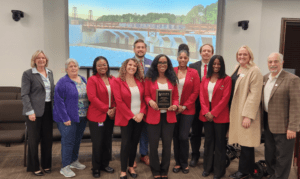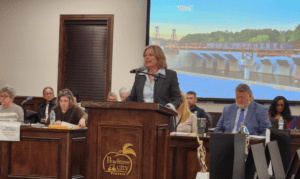The Peachtree City Water and Sewer Authority wants to save big money by refinancing two bond series for a potential savings of $1.8 million.
The refinancing also gives the authority a chance to eliminate a restriction that gives the City Council veto power over any extension of the sewer system outside of the city limits. That restriction has cost the authority a significant amount of revenue in the past several years as council turned down two proposals to provide sewer service in Senoia and unincorporated Coweta County.
In lieu of the restriction, WASA will suggest language that gives the council an advisory role on sewer projects that would extend beyond the city limits. If council doesn’t go along with the proposal, the authority’s savings in the refinancing would dip by $518,000.
WASA Chairman Mike Harman, addressing the matter at a board meeting Monday night, recalled that the city of Senoia wanted WASA to extend sewer service into the Coweta area a few years ago which would have added about $700,000 a year in revenue. But the council turned down the deal in an effort to artificially control Senoia’s growth, so the revenue was lost … and Senoia built its own sewer system with four times the capacity it sought from WASA, Harmon said.
Harman argued that WASA owes it to its ratepayers to acquire the ability to select proposals for extending the sewer beyond the city limits, particularly because there is plenty of capacity left to treat more wastewater.
After the meeting, Harman noted that WASA’s costs of operating two sewage treatment plants are fixed and can’t be cut, although WASA staff has been successful in controlling expenses.
The WASA board consists of five members who are appointed to serve by the city council but the authority receives no tax money from the city. Instead most of its revenues come from residential, commercial and industrial ratepayers, with some also coming from sewer tap-in fees for new construction.
WASA was created in the 1990s to facilitate the city purchasing of the sewer system which was then operated by Georgia Utilities Corporation, an arm of then-developer Pathway Communities. An intergovernmental agreement between WASA and the city contains language that requires a resolution from city council to allow the extension of sewer service beyond the city limits.
The point of the agreement was to restrict sewer service to the corporate limits of Peachtree City. Fayette County has historically opposed sewer service to unincorporated areas because sewer service usually means denser developments.
Prior councils and commissions have wanted to control density outside cities by denying those areas city sewer service.
The idea of eliminating that veto power comes with a cost. If council refuses to remove the language from the intergovernmental agreement so it can back the WASA bonds, the savings would dip from $1.8 to $1.3 million, and WASA would have to temporarily pony up a reserve fund of $1.85 million, which could be paid for by cashing in reserve funds.
Harmon noted that the decision is up to the city council, which has the chance to save city ratepayers about half a million dollars if it agrees to continue backing the sewer bonds.
WASA board member Tim Meredith agreed that political decisions by previous city councils have kept the authority from earning more revenue.
Harman said there was also a proposal several years ago to extend the city’s sewer into east Coweta County to serve the Fischer Crossing development. That proposal was also shot down by city council, and the development got sewer service extended by Newnan Utilities instead, Harmon noted.
Looking to the future, WASA is unlikely to extend sewer access in unincorporated Fayette County because the county commission has veto power over sewer extensions, a number of which have been halted over the years including for a church in north Fayette County that wanted to tap onto Clayton County’s sewer system.
It is possible, however, that WASA might find growth avenues in the undeveloped areas of east Coweta County and also perhaps Tyrone, some of which is currently served by the Fulton County sewer system.
Harman said he was not in favor of seeking every opportunity to extend the sewer system outside of the city, but he felt “we have been offered some select opportunities that I believe were in the best interest of the citizens that were not approved.”
WASA board member Luis Valencia said while he doesn’t want to develop a conflict with council members, the refinancing will help the authority have more money for capital improvements.
WASA board member Phil Mahler noted that even without the veto power for out of city sewer extensions, the city council could still decide to back WASA’s sewer bonds to save money for residents and business owners.











Leave a Comment
You must be logged in to post a comment.